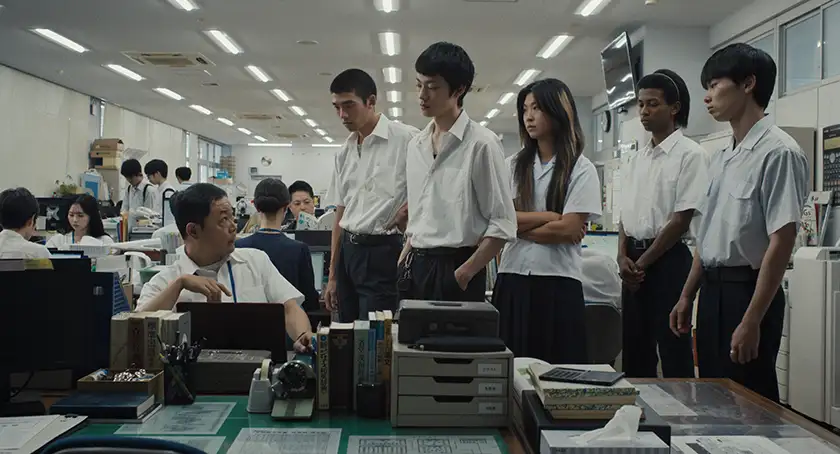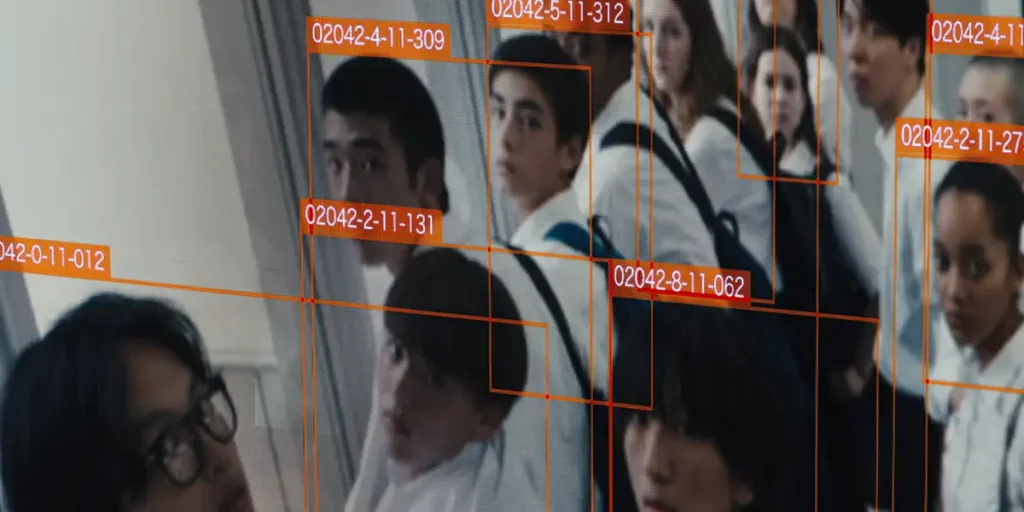The titular “Happyend” is democracy for the students in Neo Sora’s first fiction film, a stunning dystopian coming of age tale with infectious personality.
Writer-Director: Neo Sora
Genre: Drama, Coming of Age
Run Time: 113′
Venice Premiere: Sept. 2, 2024
U.S. Release: Sept. 12, 2025
U.K. Release: Sept. 19, 2025
Where to Watch: Select U.S. theaters and UK & Irish cinemas
Happyend begins by describing itself as “a story that defines the near future,” and it’s not hard to tell that the future writer-director Neo Sora is worried about is that of the country of Japan. But while we’ve gotten plenty of dystopian tales about citizens standing up to oppressive societies, the Ryuichi Sakamoto | Opus‘s first first fiction film manages to distinguish itself from the crowd with a story that revolves, first and foremost, about its very human protagonists.
At the center of it all is a high school in a near-future Tokyo, from which Yuta (Hayato Kurihara / 栗原 颯人) and Kou (Yukito Hidaka / 日高 由起刀) are about to graduate. When we first meet them, the two best friends are living their best lives, devoting as much of their time as possible to what they’re truly passionate about: music. At night, we see them be kicked out of an underground techno club and eventually end up at their high school, where they break into the “music research club” and mix and record gorgeous tracks, letting the sounds they create envelop them completely, in that sort of dreamlike state that defines our teenage years. As we watch our two leads be their charming, carefree selves, their energy is contagious, and we’re immediately drawn to the secret world they’ve created that lets them escape their daily preoccupations.
One of these concerns has to do with natural disasters, as the society in which they live – a Japan where, we’re told by the film, “the systems that define people are crumbling, but something’s about to change” – is plagued by the threat of a looming earthquake that could potentially cause significant damage, in addition to a worrying political scenario. But when Yuta and Kou decide to pull a prank on their Principal, one night, their worries become more imminent, as their actions lead to an oppressive security system being installed at the school that can detect everyone’s faces and automatically subtract “points” from each of them, affecting their academic performance.

Besides affecting their grades, this also marks a turning point for our characters’ friendship, as Kou meets a student activist named Fumi (Kilala Inori / 祷 キララ) and starts to be interested in politics sparks an interest in politics. But it also causes him to distance himself from Yuta and join a completely new group of friends that also includes the USA-bound Ata-Chan (Yuta Hayashi / 林 裕太) and a few more students. As the film unfolds, Yuta and Kou’s shifting dynamics mirror the students’ fight to be heard, until the battle becomes one: that which will determine which kind of human beings our students will grow into.
Happyend becomes a bit unfocused at the end, preventing its overall message from really coming through as well as it could have. However, this is also a movie that oozes personality from the moment its opening credits appear, in a goosebump-worthy scene where glowing red dots on the black screen turn out to be not stars in the sky but the lights of Tokyo’s skyline, and Lia Ouyang Rusli’s magical score draws us into a world that we could inhabit for hours. Most of the students are played by non-actors, who all do a fantastic job at bringing them to life, imbuing them with authenticity from the moment we meet them. As the school principal, Shiro Sano (佐野 史郎) is fantastic, and a great source of comedy in a film that manages to be both heartfelt and comical.
In the end, Neo Sora’s message is best summed up by a student’s statement at the end of the movie: “all we did was ask someone in power to do the right thing,” which comes in the form not of rebellion for rebellion’s sake, but of good old democracy. And even though these are just students, it’s clear that what the school represents is the country itself – a society made of individuals who have the right to be heard, but who also need to learn to take responsibility for their actions. Happyend presents itself as both an allegorical political tale and the coming of age story of two boys whose friendship evolves as they grow into themselves – and it absolutely succeeds at being both.
Happyend had its World Premiere at the Venice Film Festival on September 2, 2024. The film will be released in select U.S. theaters on September 12, 2025 and UK & Irish cinemas on September 19. Read our reviews of Dreams on Fire and The Ties That Bind Us!

